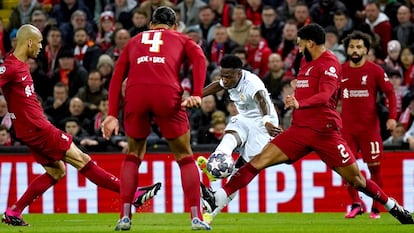The LaLiga paradox: financially healthy clubs, but unable to compete with the Premier League
English clubs spend 18 times more than Spanish ones on transfers thanks to money injected by foreign funds. Strict economic rules have eliminated insolvency problems in Spain, but curtailed clubs’ ability to attract players

In October 2021, Newcastle, also known as the Magpies, were second to last in the Premier League, the highest level of the men’s English football league system. But the Premier League’s approval of the club’s purchase by the Saudi Arabian sovereign wealth fund (PIF) for €350 million changed everything. Despite the team being at the bottom of the league tables, the Magpies got out their check book and began casting their net in unusual fishing grounds. They paid €50 million to Olympique Lyon for Bruno Guimarães and another €16 million to Atlético Madrid for Kieran Trippier. Consequently, Newcastle climbed up the table to finish the season more or less in the middle of the league tables. They are now sixth, in a tale that clearly illustrates the power of the Premier League compared to the rest of the European leagues, including Spain’s LaLiga.
Spanish soccer has developed a sharper competitive edge in recent years, but it still can’t compare to that of the Premier League. The basis of Spain’s recent momentum has been the improvement in club finances due to financial controls imposed 10 years ago. At that time, there were more than 20 clubs dealing with insolvency issues, which meant they were not paying their players’ salaries or meeting their Social Security obligations. But the governing body of the game turned the situation around. “We have even withstood the Covid pandemic,” explains Javier Gómez, general director of LaLiga and the mastermind behind a system that ensures the sustainability of Spanish clubs’ accounts. “There have been problems, of course, but not payment defaults.”
Economic control has involved establishing a system to prevent the creation of unsustainable debt. For example, when making transfers, teams must take into account the salary limit, which is calculated by subtracting non-sporting expenses and debts incurred from budgeted revenues. In practice, this means curtailing the impulsive decisions that once generated irreparable holes in the accounts.
LaLiga no longer allows teams to reach borderline situations in which their economic viability depends on getting the ball in between the goal posts. “At the beginning it was simple – to solve what was important, but it has become more complicated,” says Gómez. “For example, at the beginning, there was oversight for the previous year. From there we moved on to monitoring the year ahead. Then growth in revenue slowed with the pandemic, and we had to look further ahead. The objective now is to do it for three-year periods and a pilot program was approved on November 24 of last year.”
Another change to the regulation is its punitive capacity: “There are sanctions if it is not complied with, such as not being able to register players for a year,” says Gómez.
Foreign threat
But there is a paradox here and that is that the economic control over Spanish soccer has meant it has lost its competitive edge in international markets. Especially when it comes to the Premier League, which devours everything in sight, not just clubs in the UK, but also, for example, the Paris Saint-Germain (PSG) club, owned by a Qatari fund that has now also shown interest in Manchester United.
If we look at the figures for the last few seasons, the Premier League earns far more than any other. Compared to LaLiga, the English competition’s revenue from television rights is almost double – over €4 billion versus just over €2.billion. This explains much of their spending power. Since the 2021-2022 season, the Premier League has spent almost €3 billion more on transfers than it has earned, while in Spain, according to Transfermarkt data, first division clubs have spent just €164 million in that time. In other words, spending on buying players is 18 times higher in the UK than in LaLiga, not to mention the extra cost of higher wages – a difficult situation to sustain over time.
During an encounter with economic journalists last month, LaLiga president Javier Tebas described this unfair competition as a model for the rich. “The Premier League has a loss-making model that is unsustainable,” he said. “It has become a competition of tycoons and state clubs. Is that good for the future of soccer?”
In recent weeks, the possible sale of two American-owned English clubs, Manchester United and Liverpool, has made headlines. “The American investor does not want to lose money,” explains a source close to the Union of European Football Associations (UEFA) executive committee. “They’re not among those with petrodollars who use the club as a game and a way to clean up their image. They are looking to sell it for a good price and compensate for the spending of recent years.”
The ball is now in the UEFA’s court. In fact, Tebas praises the work done by the UEFA, which is headed by Aleksander Ceferin. “UEFA has already slapped sanctions on a few times, but then the Court of Arbitration for Sport (CAS) has knocked it down,” he says. “That’s where the problem lies: there’s a huge conflict of interest and I don’t think it’s the court we should go to.”
The Impulse Plan
LaLiga has sought help in the shape of an injection from the CVC Capital Partners fund: nearly €2 billion for 8.2% of the commercialization of matches over the next 50 years, including broadcast, digital and other business rights. Limits are set for each of the items to which the money can be allocated – mainly so that not all of it is used on players, which involves risks. The main stipulation is that the teams receive some amounts in advance, in exchange for giving up a part of the future takings. In other words, it will be beneficial if the part that is put in the hands of the teams revaluates much faster than it would have done with the inertia it had before this injection. And that remains to be seen.
Real Madrid and Barcelona did not join the pact and, in fact, tried to overturn it in the courts and also by trying to convince the rest of the clubs to vote against it. Despite this, the so-called Impulse Plan went ahead with 38 clubs signing up to it. “Except for the big ones, the teams would not have been able to access this kind of investment under these conditions on their own,” says Tebas. “That’s why we have proposed it jointly. It is strategic.”
The support came as a godsend for the group hardest hit by the pandemic, which needed financial backing just to survive. “We wouldn’t have been able to invest this kind of money in branding or infrastructure right now,” explains Quico Catalán, president of Levante.
Meanwhile, the motivation for those clubs not in over their heads has been different: for example, Amaia Gorostiza, president of the Basque team SD Eibar, whose finances are healthy enough, says, “it will allow us to have our first very own sports city.” Regarding Valencia CF, the injection will be key to completing its new Mestalla stadium, to which they will devote two thirds of the funds received from the plan, amounting to €80 million.
CVC, on the other hand, are convinced that they will take advantage of LaLiga’s business in the future. Although Javier de Jaime, head of the fund in Spain, did give the clubs some homework: “We are confident about the investment, but there is still a lot of work to do,” he says. “We have to put more into management, as well as into sports. We need an ambitious plan that will multiply the value of the clubs and LaLiga.”
Sign up for our weekly newsletter to get more English-language news coverage from EL PAÍS USA Edition
Tu suscripción se está usando en otro dispositivo
¿Quieres añadir otro usuario a tu suscripción?
Si continúas leyendo en este dispositivo, no se podrá leer en el otro.
FlechaTu suscripción se está usando en otro dispositivo y solo puedes acceder a EL PAÍS desde un dispositivo a la vez.
Si quieres compartir tu cuenta, cambia tu suscripción a la modalidad Premium, así podrás añadir otro usuario. Cada uno accederá con su propia cuenta de email, lo que os permitirá personalizar vuestra experiencia en EL PAÍS.
¿Tienes una suscripción de empresa? Accede aquí para contratar más cuentas.
En el caso de no saber quién está usando tu cuenta, te recomendamos cambiar tu contraseña aquí.
Si decides continuar compartiendo tu cuenta, este mensaje se mostrará en tu dispositivo y en el de la otra persona que está usando tu cuenta de forma indefinida, afectando a tu experiencia de lectura. Puedes consultar aquí los términos y condiciones de la suscripción digital.









































